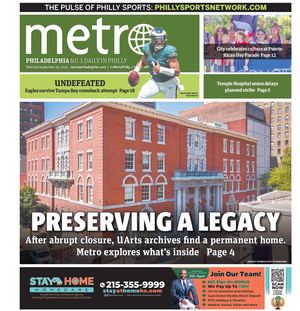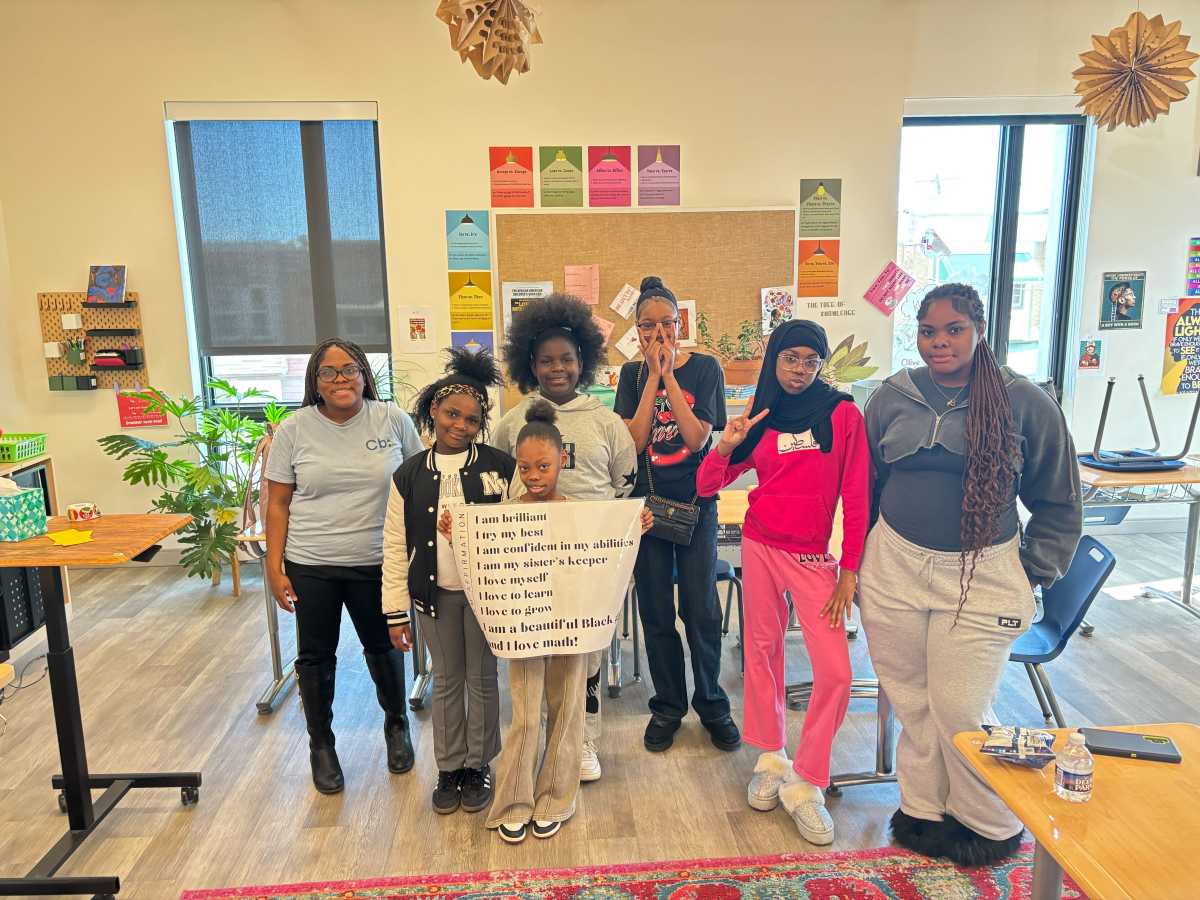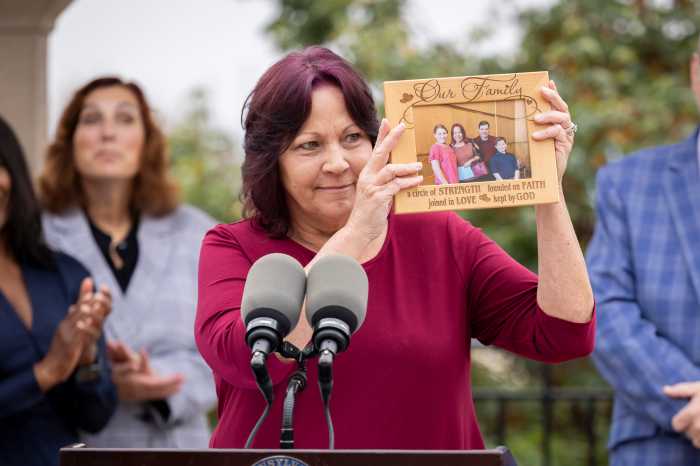When nine-year-old Elizabeth sat down for an after-school math program with Black Girls Love Math, she wasn’t just solving equations — she was finding her safe space.
Surrounded by girls who looked like her, she gained confidence, joy, and a sense of belonging. That’s exactly what founder Atiyah Harmon envisioned when she launched the Philadelphia-based STEM program in 2020 — and with new state funding, she’s growing the program’s reach even further.
Harmon says she founded the program to transform how Black and Brown girls experience math. Through a culturally affirming, student-centered curriculum, Harmon said, BGLM builds math confidence and pathways into advanced courses and STEM — science, technology, engineering, and math — careers.
“Culturally affirming means we use the girls’ interests, lived experiences and intentional mindset development,” said Harmon. “BGLM starts and ends each session with a math creed of positive affirmations, using call and response. The creed ends with the sentence ‘I am a beautiful Black girl and I love math.’”
For the 2025-26 school year, Harmon said she is planning a deeper engagement with schools to provide other alternatives to their programming. The state recently awarded BGLM $125,000 to expand their Saturday Math Slam program which they run in Philly, Camden, and Brooklyn.
Each week, BGLM answers the age-old question, “Why do I need to learn this?” by highlighting a STEM Shero. The Sheroes are women who use math in their careers. A few examples are Katherine Johnson (NASA), Gladys West (GPS) and Sarah Bond (XBox).
“STEM Sheroes provide the representation of career options that use math daily,” said Harmon. “By engaging with video, discussion and reflection on Sheroes weekly, the girls can imagine and learn about diverse career pathways.”
Partnerships, community programming
Black Girls Love Math partners with schools and other community organizations to provide out-of-school programming for students from elementary through high school, through after school enrichment, Advanced Placement support, college prep, math competitions, and career exploration with women of color in STEM. With small group learning and teacher training, BGLM has empowered over 250 students and is expanding into other areas.
“Families send their kids to us; we build strong relationships with parents and advise how they can support their students outside of our direct programming,” Harmon said.
In Philadelphia, BGLM instructors worked with about 50 students directly through schools for the 2024-25 school year at Girard College, Global Leadership Academy and St. James School.
BGLM held a Family Math Fall Festival in November 2024 at Temple University. They also held a STEM Night Showcase in February 2025 at John Moffet School.
The program also hosted an after school program at Gideon Elementary, where “a Black woman STEM teacher offered the programming pro bono while acknowledging the budget constraints,” said Harmon.
This Fall, BGLM will launch their first Saturday Slam Program at Morton Elementary.
Safe space for girls
Beatrice, parent of nine-year-old Elizabeth, said the BGLM programming is “amazing,” and Elizabeth found her “safe space” there.
Elizabeth attended BGLM for after school enrichment in second and third grades during the Fall and Winter/Spring semesters.
“The program focused on enrichment rather than remediation,” said Beatrice. “She was in community with other girls that look like her.”
Harmon said the challenge is the intersectionality of being a “Black girl” with assessment data. “Black or a girl — the data for these specific groups is not often disaggregated publicly,” she said. “We’re hoping to work with SDP and get a more in-depth data analysis of our target population.”
BGLM’s focus on STEM exploration was important for Elizabeth, she said. “Most girls are not tracked to STEM as they get older.”
Last school year, BGLM also offered three professional development sessions for teachers to help improve instructional practices with math, specifically for students who might need more joy or different ways to engage in math. Harmon said they had over 100 teachers show up between three sessions.
Joy and humor are two of their core values.
“We highlight cooperative math games intentionally to spark joy with fitness fluency as a way to build multiplication with all grades,” said Harmon. “Especially as math fluency is a building block for Algebra readiness and math success.”
Harmon said BGLM’s programming is “more supplemental” to the district’s math curriculum.
“We’re not trying to replace what happens in the class,” she said. “The district’s new curriculum, which is problem-solving based, is the same approach we do in our after school program.”
“Up until this past school year, we offered all programming — both after school and weekend — only two days,” said Harmon. “This upcoming school year, we’re offering it for four days with potential collaborations on Saturdays, depending on what schools and students are interested, and depending on the school’s budget and their availability.”
The $125,000 awarded from the state will be used for support, especially as federal funding shifts.
“How can we still support students in Philadelphia in schools that want our programming?” she asked.
Building toward the future
Harmon’s vision is for approximately 1,000 students over the next five years to be impacted directly by their work, specifically through school and community partnerships. BGLM plans to do a teacher training model to get more certified math teachers. Their goal is to train 75 math teachers and get them to become Pennsylvania state certified math teachers. This would be a cohort of 15 teachers a year over the next five years.
Harmon said they want to adopt and modify their current program model for adult women to become certified by helping with PRAXIS Prep (standardized testing) and supporting any content questions with Pennsylvania math standards.
Illustrative Mathematics is the curriculum that Harmon has been involved with since 2018.
Harmon served as Network Director of Math, Science and Assessment for Great Oaks Charter Schools, a network of charter schools in the Northeast Region. In the summer of 2020, Harmon served as a co-author of the 8th grade Supports for Distance and Unfinished Learning with Illustrative Mathematics. This work was funded by The Gates Foundation to support schools and districts during the pandemic to support teachers and students.
“I highly support the (district’s) curriculum and I like the choice, even if the rollout takes a little longer to adopt systemwide,” she said. “I was a former principal, and I taught it (Illustrative Mathematics) alongside my teachers to our 7th grade students and adopted it, and it’s the curriculum I advocate for.”


























